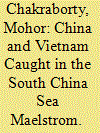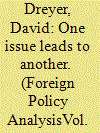| Srl | Item |
| 1 |
ID:
158238


|
|
|
|
|
| Summary/Abstract |
Over the past four months, China has been swept by the ‘Xi wave’, stimulating a tide of concerns for its neighbours and ardent observers. Xi’s 203-minute speech at the 19th Congress of the CCP, followed subsequently by the CCP’s announcement of dropping the term limits for president (in February 2018) clearly herald the dawn of a “new era” of politics and power for a more assertive China, under the leadership of President Xi.
|
|
|
|
|
|
|
|
|
|
|
|
|
|
|
|
| 2 |
ID:
099755


|
|
|
|
|
| Summary/Abstract |
Rather than competition over one issue or another (such as territory or status) leading to war, in this study it is argued that war is often likely the result of an issue spiral-a dynamic process in which tension increases as multiple issues accumulate. Once an initial issue disagreement is established, the development of enemy images may cause states to view the "other's" behavior and intentions in relation to additional issues as threatening. States may subsequently seek to gain an advantage on a new issue in order to prevent one's competitor from doing so, or in order to gain leverage on other issues. A state's aggressive actions in relation to new issues tend to reinforce their rival's perceptions that the state has aggressive intentions in relation to earlier established disagreements, further increasing tension. Issue accumulation, furthermore, increases the stakes of competition, which increases the likelihood that states will be willing to bear the costs of war seeking favorable issue settlement. As tension heightens and the rationality of engaging in large-scale militarized conflict increases, a state may initiate war if a rival presses its demands on an issue fearing that failure to demonstrate resolve will lead one's competitor to press its demands on other issues as well. An examination of relations between China and Vietnam in the 1970s reveals that an issue spiral, in which one issue led to another and the accumulation of issues contributed to the deterioration of relations, precipitated the 1979 Sino-Vietnamese War.
|
|
|
|
|
|
|
|
|
|
|
|
|
|
|
|